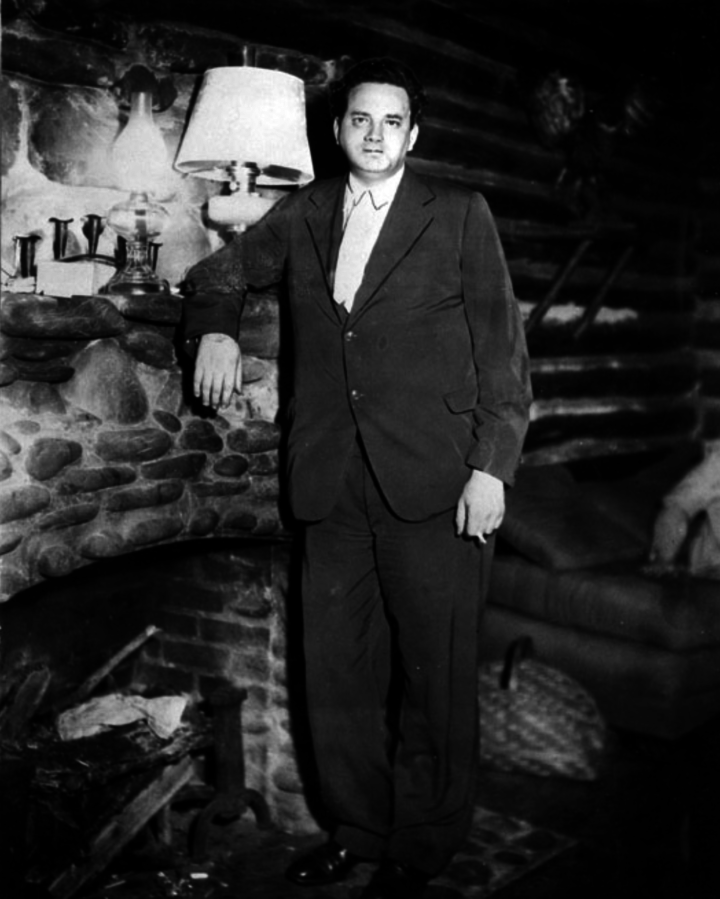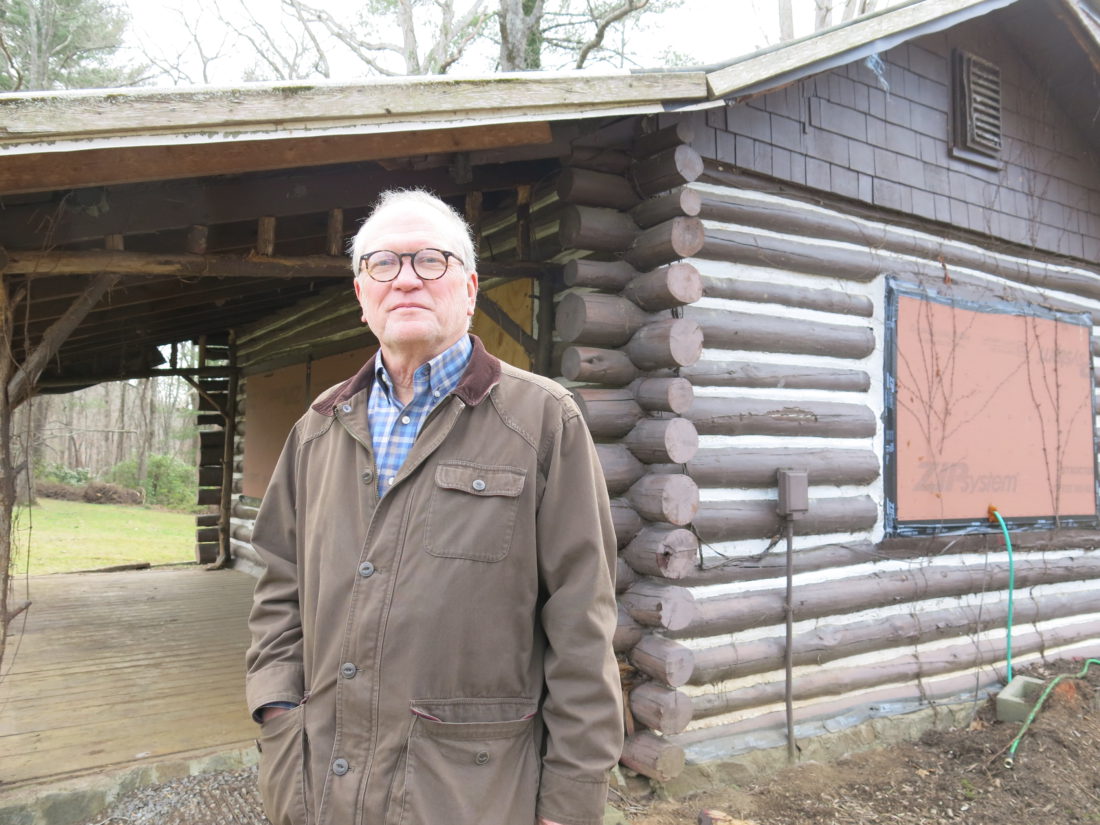The following conversation with local author Terry Roberts marks the launch of “Look Homeward,” a new monthly feature focused on writer Thomas Wolfe. The series is inspired by the show “One True Podcast,” which is hosted by author Mark Cirino and invites fellow writers, historians, artists and scholars to discuss the work and life of Ernest Hemingway. “Look Homeward” strives to do something similar, albeit with a Western North Carolina bend.
Born Oct. 3, 1900, Wolfe chronicled much of his life in Asheville through his autobiographical fiction. His best-known novel, Look Homeward, Angel (1929), is a coming-of-age story about a young boy raised inside his mother’s boardinghouse. For readers new to the area, the property that inspired the tale — the Old Kentucky Home — still stands in downtown Asheville and can be toured Tuesday-Saturday.
Though Wolfe will be the initial focus of the “Look Homeward” feature, the monthly column will eventually shift focus to other celebrated writers with ties to WNC. Future candidates include Wilma Dykeman, John Ehle and O. Henry.
Xpress: In the spirit of “One True Podcast,” let us begin with your one true sentence from author Thomas Wolfe.
Roberts: It turns out that I know Wolfe only too well. Way too many sentences came to mind, so I ended up choosing one that is more personal. The following is from Chapter 5 of Look Homeward, Angel:
“Eugene watched the sun wane and redden on a rocky river, and on the painted rocks of Tennessee gorges: the enchanted river wound into his child’s mind forever.”
What is it about this sentence that speaks to you as a reader, and what does it reveal about Wolfe as a writer?
Like Wolfe, I grew up in Buncombe County, and I traveled with my family along the French Broad River gorge to points west and north. And like Wolfe, I was mesmerized by the wild beauty of the “rocky river, and … the painted rocks of Tennessee gorges,” such that the river will always live in my mind’s eyes as I saw it when a boy … right along with how I see it today.
And I think that’s one of Wolfe’s enduring gifts as a writer. He is able to juxtapose the fierce reality of memory with the sensual reality of the current moment. And he is able to do so in a way that calls out of us, as readers, a similar response. The past and the present fuse into one experience. It’s very complex and very difficult, and yet it was perhaps his primary gift.
As a writer myself, I often try to replicate this effect in my own fiction, but rarely — if ever — with the same intensity. Whatever else we may think about Wolfe as seen through the current cultural lens, we can never deny his power to compel us into the past of our own lives.
That gets at another topic I’m interested in discussing: Wolfe’s legacy. Why do you suppose his writing isn’t as widely read today as some of his contemporaries, such as F. Scott Fitzgerald and Hemingway?
First, he is often stereotyped as the author of long and not necessarily well-made novels. The primary thing readers tend to know about him is that he is the author of Look Homeward, Angel, which they assume is long, undisciplined and autobiographical. Of Time and the River [Wolfe’s second novel published in 1935] is even longer.
The second problem for contemporary readers is his style. He rarely used five words when 25 would do and so stands in stark contrast to Hemingway, for example. Unless you love language for the sake of language — which many writers do — it can be hard to swallow. We live in an age of brevity — both in the length of our books and in the length of our sentences — and so Wolfe is currently out of fashion.
Sadly, what most contemporary readers don’t know about Wolfe is that he was a brilliant short story and novella writer and that much of his very best work is in those genres. They should begin with “Web of Earth” and “Child by Tiger,” not Of Time and the River and You Can’t Go Home Again [Wolfe’s final novel, published posthumously in 1940].
We should also address the current charge that Wolfe is a racist, which is also one of the controversies that haunt his reputation, especially in the academy.
Yes — let’s discuss.
The starting place for anyone who takes this question seriously is Paschal Reeves‘ important 1968 book, Thomas Wolfe’s Albatross: Race and Nationality in America. An important thing to note is that for Reeves and other careful readers of Wolfe, the issue is his attitude toward characters of a wide variety of racial identities, not just Black Americans. In addition, Wolfe’s attitude toward Jews was at the core of his life and work, primarily because of his well-documented relationship with his mistress, Aline Bernstein. To go deeper on this issue, you should find online Morton I. Teicher‘s wonderful 1998 essay, “Was Wolfe an Anti-Semite?” Teicher, who was Jewish, takes on this important topic with a clearheaded insight into the entirety of Wolfe’s career.
There are two things worth saying on this topic. The first is reasonably straightforward. Wolfe came from an overtly racist background. There is ample evidence in his early, autobiographical work of racist attitudes. As he matured, he changed. His experiences in Germany during the 1930s along with his evolving attitudes toward America led to a sea change in his attitudes. Two important works — “Child by Tiger” and “I Have a Thing to Tell You” — were the result of his growing understanding of the plight of Black Americans and European Jews. Simple fact: Wolfe changed, and that change is evident in his writing.
The second important thing to say on Wolfe and racism is that there is ample evidence that Wolfe’s white, male contemporaries — especially Fitzgerald — were thoroughgoing racists. But unlike Wolfe and [William] Faulkner, Fitzgerald and Hemingway didn’t write about Black America. Their attitudes were rarely, if ever, exposed in their work. Wolfe, on the other hand, focused a harsh light on everyone he saw around him, including the members of his own family. No one, regardless of race, was exempt.
The last thing I would say here is that many sensitive Black and Jewish readers find the world portrayed in Look Homeward, Angel a frightening place. A place that is hard to endure upon first reading and all but impossible to revisit. I can’t say that I blame them. When I first tried to read it, I was too young, and I found it terrifying. I would counsel us all to read the work Wolfe produced in his 30s and to consider just how much he evolved — both as a writer and a man.
Would you mind speaking a little more on Wolfe’s time in Germany?
Thomas Wolfe had a complex relationship with Germany. When he visited there in the early 1930s, he was lionized. He was a literary celebrity in Berlin and elsewhere, and he felt at home there in a way that he seldom had in the United States. By the time he visited in the summer of 1936, however, it had become obvious that Germany was under the bootheel of the Nazis, and it was impossible for him to ignore the increasing evidence that Germans were living in a police state.
He attended the 1936 Olympics — think Jesse Owens — where Wolfe saw Hitler worshipped by thousands of people, and when he left Germany that year by train, he saw a frightened Jewish man arrested at the border. He later captured these events in the novella, “I Have a Thing to Tell You,” and after its publication, he was never allowed to return [to Germany]. These events are part of what caused Wolfe to examine his own antisemitism during the 1930s, when he began to think in radically different ways about the poor and outcast members of all societies, including America.
In 1937, Wolfe returned to Asheville to visit family and friends. If you could go back in time and meet Wolfe, where would you two convene, and what might be your beverage of choice?
I think we’d be drinking homemade corn liquor that he had stashed away in the cabin at Oteen. I would ask him what he’s learned about writing since his Chapel Hill days and his first novel. What does he know about himself as a writer that he didn’t know when he began?
Can you tell readers more about the Oteen cabin?

Thomas Wolfe returned to Asheville in 1937 after years of living alone in New York City and traveling extensively in Europe. He had alienated many people in his hometown eight years earlier by writing about recognizable, local “characters” in Look Homeward, Angel, and he was uncertain of the reception he would receive, including from his own family. Most, if not all, was forgiven, however, and he received a warm welcome.
You can read about Wolfe’s visit home in Joanne Marshall Mauldin‘s wonderful book, Thomas Wolfe: When Do the Atrocities Begin? In fact, Wolfe’s welcome home was so warm that he had to find a place outside of town where he could write. That place was the cabin in Oteen that has become famous in Wolfe circles. The city owns that cabin today, but sadly, it has fallen into extreme disrepair, and urgent action is needed from the city of Asheville and from all of us who care about writers and writing. A feasibility study and master plan for the property was completed prior to the pandemic, but it’s time now to act on that master plan.
Lastly, as an author of several books, how has Wolfe influenced your own writing?
I think that Wolfe has influenced me as a writer in two ways. One, he has helped make me extraordinarily conscious of language, especially the language one commits to print. Even in a novel of 400 pages, every word is, in essence, a choice that the writer makes. Certainly, I feel this way about my own work. When I reread a published novel, I realize that I didn’t always make the right choices, but each word was a choice. The second way that he has influenced me is that with all his flaws — and Lord knows there are many — he still had the courage to write what he saw and heard. He took chances as a writer, and for me, there has always been a lesson in that.



Before you comment
The comments section is here to provide a platform for civil dialogue on the issues we face together as a local community. Xpress is committed to offering this platform for all voices, but when the tone of the discussion gets nasty or strays off topic, we believe many people choose not to participate. Xpress editors are determined to moderate comments to ensure a constructive interchange is maintained. All comments judged not to be in keeping with the spirit of civil discourse will be removed and repeat violators will be banned. See here for our terms of service. Thank you for being part of this effort to promote respectful discussion.